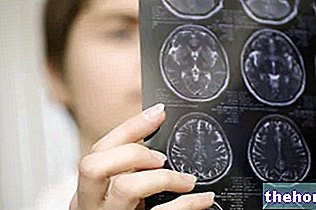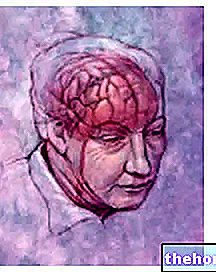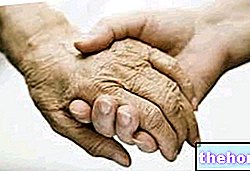Generality
Korsakoff's syndrome is a reversible neurological disease that arises from severe vitamin B1 deficiency.

Symptoms of Korsakoff's syndrome consist of severe memory disturbances (such as anterograde amnesias and retrograde amnesias), personality changes, confabulation, apathy, etc. Additionally, some people with Korsakoff syndrome also suffer from a form of encephalopathy, called Wernicke's encephalopathy.
Therapy involves the administration of thiamine, first parenterally then orally. The treatment can last a long time and complete healing can take place even after years.
What is Korsakoff's syndrome?
Korsakoff's syndrome - also called Korsakov's syndrome or Korsakoff's psychosis or amnesic-confabulatory syndrome - is a neurological disorder that usually occurs in chronic alcoholics and sometimes in people who have been malnourished for a long time.
Being characterized by memory disturbances, it is considered by doctors to be a form of dementia (hence, the fourth name of Korsakoff's dementia), even if it is of a temporary nature.
EPIDEMIOLOGY
According to various statistical surveys, concerning several countries in the world, Korsakoff's syndrome is present in 0.8-3% of the general population.
Most affected are men between the ages of 45 and 65, with a history of chronic alcoholism. However, individuals of all ages can get sick, meaning men younger than 45 and older than 65.
In women, Korsakoff's syndrome is a rarer phenomenon and mainly affects young adults. Furthermore, it should be remembered that women are more vulnerable to disease, as a woman's body is more sensitive to the effects of alcohol.
Finally, in the next chapters, we will see how Korsakoff's syndrome is often associated with a particular form of encephalopathy, called Wernicke's encephalopathy. The simultaneous presence of these two morbid conditions is called Wernicke-Korsakoff syndrome.
ORIGIN OF THE NAME
Korsakoff's syndrome is named in honor of Sergei Korsakoff, the Russian neuropsychiatrist who first described its general characteristics in the late 19th century.
Causes
The cause of Korsakoff's syndrome is a severe deficiency of vitamin B1, or thiamine.
This vitamin - which is found above all in meat, cereals, eggs and dried legumes - plays a fundamental role in energy metabolic processes, in particular those concerning carbohydrates.
THIAMINE DEFICIENCY: WHAT CAUSES IT?

Other situations that can cause a vitamin B1 deficiency are:
- Wrong diet
- Recurrent vomiting
- Food disorders
- Side effects of chemotherapy
- Hyperemesis gravidarum
- Mercury poisoning
HOW ALCOHOL INDUCES THIAMINE DEFICIENCY
The abuse of alcohol acts on the absorption of thiamine and determines its deficiency in at least three ways:
- Many alcoholics do not eat according to the nutritional needs of their organism, therefore fundamental elements such as vitamins etc. are lacking.
- Alcohol interferes with the process of converting thiamine into its active form. Vitamin B1 that is taken with food must undergo a certain process to take effect: this process, in those who abuse alcohol, is reduced.
- Alcohol inflames the inner wall of the stomach, causing recurrent vomiting. This reduces the absorption of ingested nutrients, including thiamine.
Risk factors FOR Korsakoff syndrome
- Alcohol abuse
- Chemotherapy treatment (chemotherapy)
- Kidney dialysis
- Wrong diets, as a result of which you do not eat certain foods
- Old age
- Genetic factors
- Suffering from Wernicke's encephalopathy
Symptoms and Complications
For further information: Korsakoff Syndrome Symptoms
Korsakoff's syndrome typically causes severe memory disturbances. These consist of amnesia - i.e. memory loss - which can be of an antegrade and / or retrograde type.
Anterograde amnesias are neurological deficits that make it difficult to store new information, while retrograde amnesias are neurological deficits that cause the loss of memories prior to the onset of the disease.
OTHER IMPORTANT SYMPTOMS
Doctors and experts in neurological diseases believe that, in addition to memory disorders, Korsakoff's syndrome is at the origin of other equally important symptoms and signs, such as:
- Confabulation. It is a psychiatric disorder whereby the sufferer builds false memories, referring to situations or events that never really happened.
It usually occurs during the early stages of the disease and, according to experts, it would be a way to fill in the gaps in memory. - Mental confusion.
- Sudden personality changes.
- Apathy, or reduction of behavior aimed at a purpose, due to an "absence of motivation.
- Little participation in conversations.
WHAT CAUSES MEMORY LOSSES?
From the autopsies carried out on patients with Korsakoff's syndrome, the presence of brain lesions and signs of atrophy in the dorsal nuclei of the thalamus, the mammillary bodies of the diencephalon and the hypothalamus emerged.
All these anatomical regions of the central nervous system are involved in one way or another in the memory process and this explains why a patient with Korsakoff's syndrome manifests amnesia of various kinds.
IS THE IQ UNDERSTANDING ALTERATIONS?
According to some studies, the intellectual system of people with Korsakoff syndrome would be unaffected, although there is damage to the brain structure.
WERNICKE-KORSAKOFF SYNDROME
As anticipated, Korsakoff's syndrome is associated quite frequently with a particular neurological pathology, called Wernicke's encephalopathy.
Typically characterized by ophthalmoplegia, ataxia and mental confusion, Wernicke's encephalopathy has at least a couple of aspects in common with Korsakoff's syndrome. In fact, similar to the latter:
- It arises due to an insufficient intake of vitamin B1 through the diet.
- It is particularly prevalent among alcoholics and malnourished people.
According to some statistical surveys, the simultaneous presence of Wernicke's encephalopathy and Korsakoff's syndrome - a condition previously defined as Wernicke-Korsakoff syndrome - would result in about 80% of high-grade alcoholics.
Other studies report lower frequencies, such as one in eight people with alcoholism.
Other symptoms of Wernicke's encephalopathy:
- Amblyopia, pupil abnormalities, retinal haemorrhage, papilledema and loss of vision
- Loss of hearing
- Apathy, irritability, sleepiness, fatigue and slowing of movements
- Depression, psychosis
- Lactic acidosis
- Hypothermia, hyperhidrosis and polyneuropathies
- Dysphagia, sleep apnea, epilepsy and stupor
- Cardiocirculatory disorders
- (Final stage of the disease) Spastic paralysis, choreic dyskinesia and coma
Diagnosis
At present, there is no laboratory or brain test to test whether a person has Korsakoff syndrome or "another form of dementia.
This explains why doctors, grappling with a suspected case of Korsakoff syndrome, first of all base their research on a thorough physical examination (is the patient feeding adequately?) And on a questionnaire to evaluate memory and an "eventual alcohol addiction.
IF THE PATIENT IS AN ALCOHOLIST
If the patient is an alcoholic, a valuable diagnostic tool for detecting Korsakoff's syndrome is to observe the results of alcohol detox.
In fact, if the patient were to show improvements from a neurological point of view, it would mean that he suffers from a temporary dementia, different for example from Alzheimer's disease.
Treatment
Therapy for Korsakoff syndrome sufferers mainly involves the administration of high doses of thiamine (even more than 100 mg) and the adoption of a healthy and complete diet from a nutritional point of view.

For alcoholics, failure to adopt this countermeasure (even in the presence of appropriate thiamine administration) makes it impossible to achieve any form of recovery.
METHOD OF ADMINISTRATION OF THIAMINE
At least in the first phase of treatment, vitamin B1 should be administered intravenously or intramuscularly (parenteral routes), 2 to 3 times a day. Generally, the doses of injections should not exceed 100 mg.
If larger quantities are needed, additional administrations (another 50 mg) should be done orally, as high doses of parenteral thiamine can trigger severe anaphylactic reactions.
Once the initial phase of therapy is over, doctors gradually reduce thiamine doses and resort to oral administration only.
Injections of vitamin B1 could last up to 12 months.
High doses of thiamine are accompanied by glucose injections
If given in large quantities, thiamine could damage the cells of the body. To avoid this, injections of vitamin B1 are often accompanied by injections of glucose.
NUTRITIONAL SUPPLEMENTS
If the patient is severely malnourished, he may need external supplements of:
- Magnesium
- Cobalamin (vitamin B12)
- Ascorbic acid
- Folic acid
- Nicotinamide (vitamin B3)
- Zinc
- Phosphorus
- Taurine
RECOVER THE MEMORY
For retrograde amnesias and all memory disorders in general, there is a particular form of rehabilitation aimed at recovering past memories.
Several patients who use it get good results.
TREATMENT IN CASE OF WERNICKE-KORSAKOFF SYNDROME
The treatment envisaged for patients with Wernicke-Korsakoff syndrome is almost entirely the same as that just described for Korsakoff's syndrome alone.
The only difference is an addition to the vitamin B1-based therapy, consisting in the administration of anti-inflammatories for the treatment of edema in various parts of the body (papilledema in particular).
Prognosis
Unlike many other forms of dementia (vascular dementia, Alzheimer's disease, etc.), Korsakoff's syndrome is potentially reversible.
In fact, from the analysis of a large number of cases it emerged that:
- A 25% of patients recovered completely, showing a complete recovery of neurological capacities.
- A 50% of patients recovered partially, still denouncing some cognitive deficit.
- A 25% of the patients showed no signs of recovery.
According to some studies, the ability to recover depends on the timeliness of diagnosis - the later the disease is diagnosed, the more difficult it is to fully recover the neurological faculties - and on the implementation of adequate treatments (for example, the lack of alcohol detoxification can affect decisively on the bad outcome of the therapy).
RECOVERY TIMES
Recovery times are generally very long.In fact, even those who respond very positively to therapy do not recover before two years have elapsed from the start of treatment.
Indeed, there have been patients for whom it was necessary to wait 10 years.
Prevention
Especially in the countries of the so-called Western World, where the main cause is alcoholism, Korsakoff's syndrome can be largely prevented by following a healthy lifestyle.




























